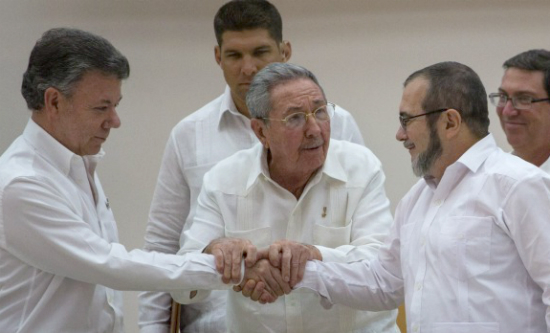
On 23 September a further step in the class struggle in Colombia was reached when the FARC and the Colombian President Santos, accompanied by President Raul Castro, announced in Havana that they expected to conclude a peace agreement by March 2016. They have agreed on a formula for transitional justice for those accused of crimes committed in the conflict such as kidnapping, murder, forced displacement, disappearance and torture.
FARC leaders had hoped the Pope would agree to meet the negotiating teams on his visit to Cuba, but the Vatican rejected the notion. However while there Pope Francis’s warned that failure was not an option, a message already made on several occasions, including directly to President Santos at the Vatican. This deal on justice, along with previous agreements made since November 2012 on rural development, political participation for demobilised guerrillas and drug trafficking, now means agreement on four of the six points of negotiations. It remains to agree how FARC will demobilise and decommission their weapons, and how to implement the final accords.
FARC’s chief, Rodrigo Londoño (Timochenko) said that a ‘propitious environment’ had been created to reach agreement on remaining points. Special tribunals, to include international judges, will judge crimes related to the conflict committed by participants or non-combatants. Voluntary confession will result in confinements – though not prison – of up to eight years. Immediate guilty pleas will mean reduced prison sentences. Those convicted without admission face the longest sentences. Membership of FARC, currently a political crime, will be pardoned, and this should apply to some 15,000 FARC members.
US secretary of state Kerry welcomed the step and let it be known that US drug trafficking charges, and extradition requests targeting FARC leaders will not be used by the US to obstruct the deal. It is clear to everyone that, despite every effort, the ruling class in Colombia cannot physically eliminate FARC’s armed opposition, which arises out of the terror applied by the state itself. The US is anxious to intensify its commercial exploitation of Colombia after the end of the civil war, as well as regaining lost political ground in Latin America. Former president Alvaro Uribe, representing the decaying, family landowning class claimed the deal will ‘generate new violence’ in the country.
Alvaro Michaels




